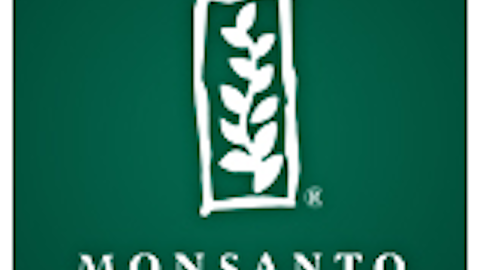Investors should always look at the big picture and have a long-term time horizon. The reality is that people need to eat. With that comes the need for more food and better farming technology.
Investors George Soros and Jim Rogers have been big fans of owning farmland and farming-related stocks. As investors look ahead, here are three stocks that will benefit from the agricultural boom.
You need a tractor to farm
When it comes to agricultural machinery, the first company you think of is Deere & Company (NYSE:DE). Under the John Deere name, the company manufactures tractors, combine harvesters, balers, planters/seeders, sprayers, and many other pieces of farming equipment.
In the second quarter of this fiscal year, Deere recorded its best-ever quarterly results. Revenues were up 9% to $10.9 billion and net income was $1.1 billion.
In looking forward, Deere & Company (NYSE:DE) sees cash receipts to farmers to be the second-highest on record. This year crop yields are forecast to be higher than last year as markets recover from last year’s drought. Cash receipts are the primary driver of equipment purchases and this is good news for Deere in 2013.
Deere & Company (NYSE:DE) expects the market in South America to be strong and sees sales in the region increasing 15% to 20% this year. Net sales for the third quarter are forecast to rise 3% compared to last year and for the full year Deere sees net sales rising 5%.
Investors with a long-term time horizon might want to consider Deere & Company (NYSE:DE) now that it has sold off 5.5% in the past three months and is off 4.6% so far in 2013. Furthermore, the company pays an annual dividend of $2.04 per share for a yield of 2.5%. The dividend payout ratio is only 23%, so there’s room to increase the dividend.
You need seeds to grow crops
Monsanto Company (NYSE:MON) is the go-to company for farmers when it comes to seeds. Its genetically modified seeds are designed to resist drought and deliver maximum yield. For farmers looking to make money, that’s music to their ears. Corn represents 75% of Monsanto’s seed sales and is the biggest crop in the U.S.
In the second quarter of this fiscal year, profits rose 22% to $1.48 billion. Revenues rose 15% to $5.47 billion and beat expectations of $5.27 billion.

The problem with Monsanto is that the company is highly controversial. Many activists and some farmers claim that Monsanto Company (NYSE:MON)’s Genetically Modified products are harmful to human health and the environment. No matter what side of the argument you are on, the fact remains that these products have been in the marketplace for almost 20 years and Monsanto sells $10 billion worth of seeds every year.
You need fertilizer to support the crops
Mosaic Co (NYSE:MOS) produces phosphate and potash crop nutrients for the global farm industry. The company produces nearly 19 million tonnes that is sold in more than 40 countries. George Soros is an investor in Mosaic and owns nearly 1.6 million shares.
In the most recent quarter of its fiscal year, Mosaic Co (NYSE:MOS) reported operating earnings of $419 million on net sales of $2.2 billion. Both were up slightly from last year. Mosaic’s potash mines operated at 78% of capacity during the quarter. Operating rates are expected to increase in the next quarter on the back of stronger demand from China and India.
In looking forward, Mosaic just entered into a joint venture with Saudi Arabian Mining, or Ma’aden, to develop a $7 billion phosphate mine. Mosaic will have a 25% interest. The mine is located in northern Saudi Arabia and will be in production in late 2016 with an annual capacity of 3.5 million tonnes. Global demand for phosphates is increasing by 1.5 million tonnes a year and this joint venture is closer to the Asian market. This will allow Mosaic’s mines in North America to focus on serving the growing demand in its home market. The project provides added growth for Mosaic, especially considering that Ma’aden is looking to expand. Mosaic couldn’t ask for a better partner than with Ma’aden.
There are some that say fertilizer isn’t necessary in farming. For farmers to continue planting the same crops without rotating, fertilizer is necessary to replace plant nutrients. Farmers plant to make money and they will plant the crop that will make them the most money. The fact of the matter is that there’s 7 billion people on the planet that need to be fed and less land to grow on.
Foolish assessment
The global food story is not going to change. The rise of Asia and Latin America will require more food and better technology to grow crops more efficiently. These three companies are poised to benefit from the increased demand for global crops.
Mark Yagalla has no position in any stocks mentioned. The Motley Fool has no position in any of the stocks mentioned. Mark is a member of The Motley Fool Blog Network — entries represent the personal opinion of the blogger and are not formally edited.
The article Bet the Farm With These Companies originally appeared on Fool.com and is written by Mark Yagalla.
Copyright © 1995 – 2013 The Motley Fool, LLC. All rights reserved. The Motley Fool has a disclosure policy.



